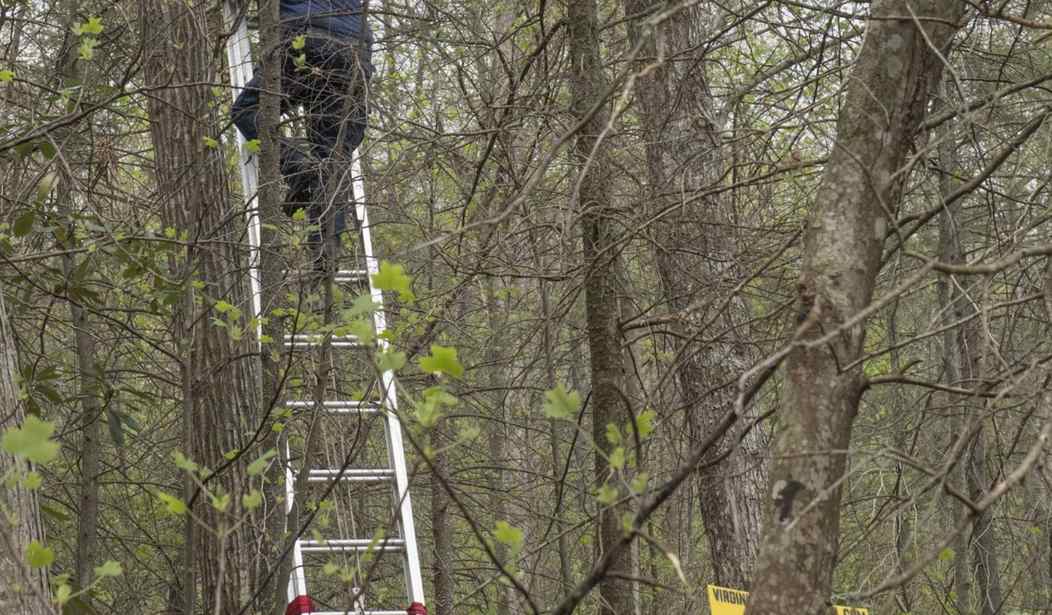Since late March, a young woman has stirred up controversy near the line that separates Virginia from West Virginia. The woman, who calls herself Nutty — no joke — has made herself a home 50 feet up a tree that stands in the path of a natural gas pipeline.
Nutty — and it’s still astonishing that she chose the nickname for herself — relies on rain for her drinking water and uses a bucket for a toilet. Forest Service Rangers stop anyone who tries to bring her food, water, and even medical care, and her supporters must stay at least 125 feet away from what she calls her “monopole.”
Rolling Stone reported on how Nutty is getting along:
“I have gallons of water stored,” she posted Tuesday on the Facebook page of Appalachians Against Pipelines (a cellphone and small solar collector enable her internet access). “I still have a stock of energy bars and some packets of applesauce. This is, comparatively, an extremely mild form of deprivation, and one I’m fortunate my body seems to have adapted well to.”
Health care professionals have expressed concerns for Nutty’s well being, and supporters have arrived to sing to her, attempt to bring food and water (which is illegal), and watch over her as best they can from outside the Forest Service’s perimeter.
And Nutty isn’t alone in her protest. The Rolling Stone piece lists several other similar activists protesting the same pipeline, including a 62-year-old who faces jail time, a farmer who has threatened to establish the mother of all deer stands, and a mother and her young daughter (pictured in the featured photo on this article) who spent weeks in a treetop before a court threatened them with a thousand-dollar-a-day fine for their protest.
These folks aren’t your typical campers enjoying the clean mountain air. They’re environmental activists of a different piece. Some of them are driven by a belief that fracking and other methods of natural gas procurement — along with the pipelines that deliver the finished product — are harmful to the planet.
It’s easy for you and me to scoff at the crazy, crunchy hippies standing up for Mother Earth, especially because natural gas is supposedly some of the “clean energy” that the environmental movement says we should pursue.
Even those who merely support folks like Nutty — but don’t get directly involved — cite the natural beauty and cleanliness of the area. Rolling Stone quoted one resident, Tasha Hiner: “I remember as a little whippersnapper going to the courthouse and the old hillbillies were sitting there with their shotguns,” says Hiner. “A lot of the adults back then successfully fought many projects like this to keep our land and water clean, and I feel like now it is our turn to stand up.”
It’s also easy to mock the protesters for their over-the-top method of getting their point across. But when you look further into the story, another issue unites many of these activists that should rile even the right — eminent domain.
Rolling Stone explains the history of eminent domain for natural gas purposes in Appalachia:
Thanks to the Natural Gas Act of 1938, which states that, “the transportation of natural gas in interstate commerce” is “affected with a public interest,” gas companies are able to gain permission from the Federal Energy Regulatory Commission (FERC) to employ eminent domain, leaving little recourse beyond direct action for communities to hit back.
Thirty-six of the 37 residents who had land set aside for the pipeline in the area surrounding Mountain Bottom Creek waterway lost land unwillingly by eminent domain. Multiple lawsuits are making their way through the court system as well. (Yes, there could have been some financial restitution for the land, but I don’t know. Somehow I don’t imagine it was much, if any at all, or else we would have seen more than one landowner agree.) This is the federal government giving out certificates that allow corporations to seize land. Let that sink in.
It’s one thing to protest a natural gas pipeline — even in extreme ways — because you think it’s bad for the planet. We know a lot of people can agree or disagree about the environmental impact of fracking and pipelines. But we should all be appalled by the federal government’s use of eminent domain. Knowing that eminent domain played such a strong factor in these protests make these people seem less freaky to me. Well, maybe a little less.










Join the conversation as a VIP Member